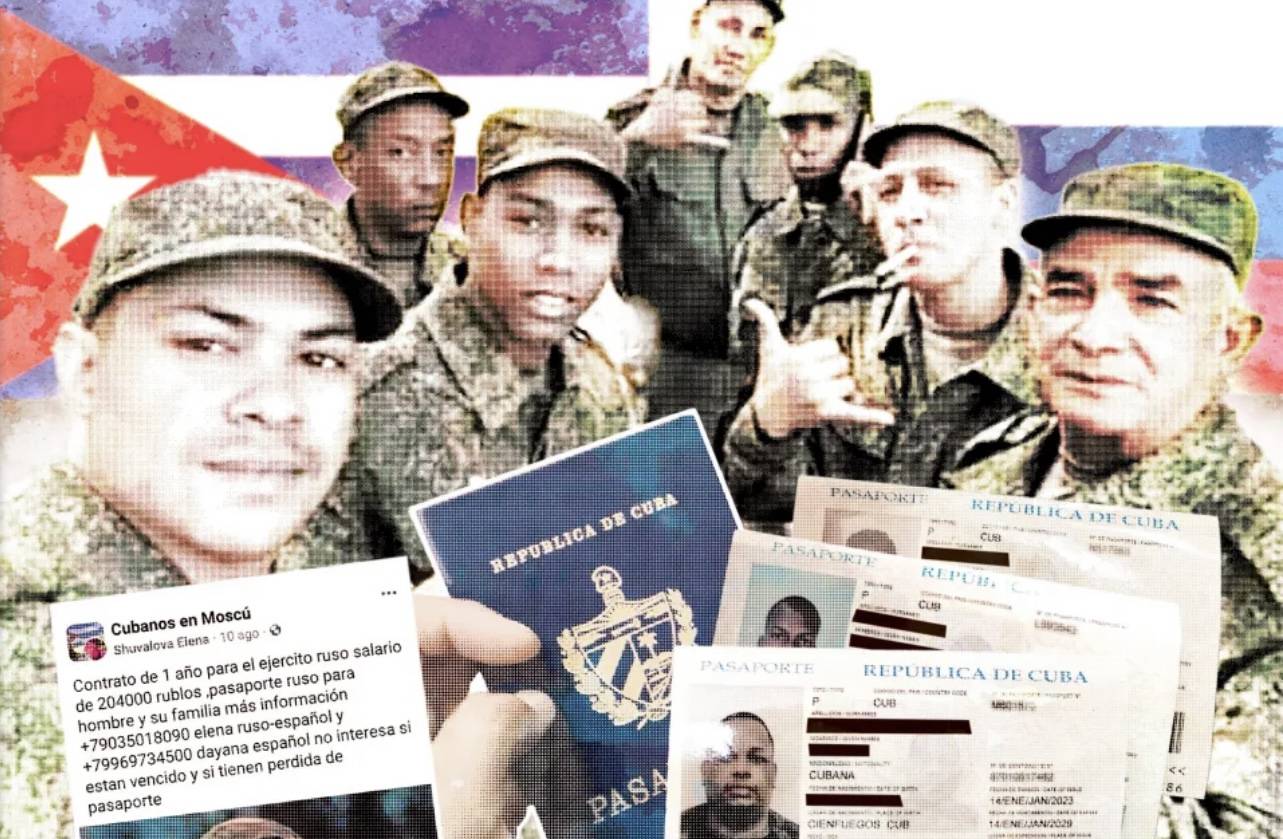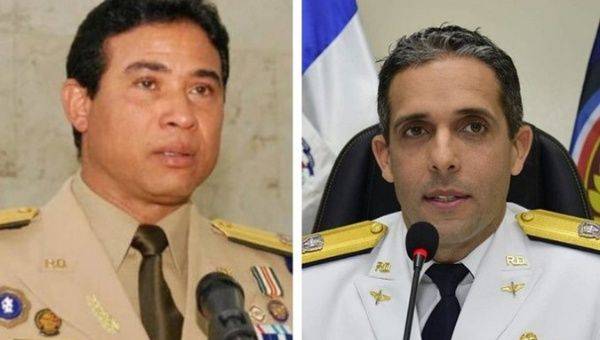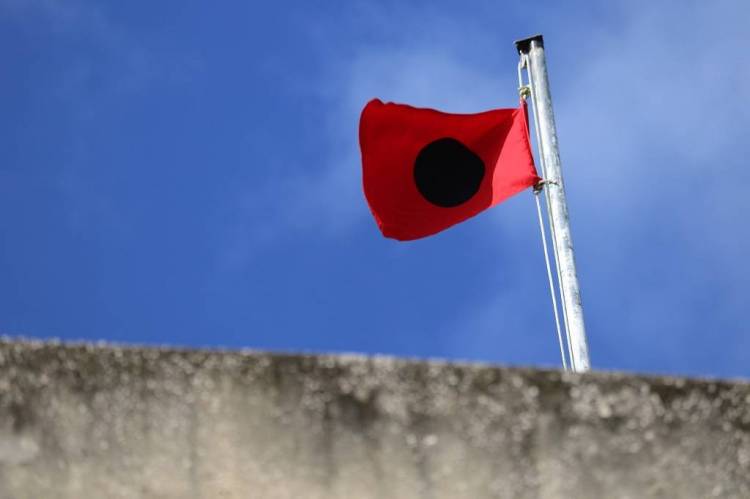How Russia Is Recruiting Cubans to Fight in Ukraine

Alex Vegas Díaz was surprised to find himself sleeping next to Russian soldiers in a trench in Ukraine, more than 6,000 miles from home. In his telling, the skinny 19-year-old Cuban accepted an offer posted on WhatsApp to make good money doing “construction work” for the Russian military. Instead, he and a friend were taken to a base, outfitted with weapons, and sent against their will to the front lines of a war they never intended to join.
“What is happening in Ukraine is ugly—to see people with their heads open before you, to see how people are killed, feel the bombs falling next to you,” Vegas Díaz said in an Aug. 31 video, speaking from a Russian hospital, where he said he was recovering from an illness before being sent back to the front. “Please, please help get us out of here.”
The plea for help went viral. Similar stories began to surface, as Cubans posted online and called into talk shows to ask for information about family members who had also flown to Moscow to join the Russian military. The outcry eventually prompted the Cuban government to issue a striking allegation: a “human trafficking network” operating out of Russia was luring young Cubans to enlist to fight in Ukraine. On Sept. 8, Cuban officials said they had arrested 17 people in connection with the alleged trafficking scheme. They could face up to 30 years in prison for engaging in mercenary activity, which is against Cuban law.
But social-media posts, audio messages, and videos from recruits in Russia reviewed by TIME, along with interviews with family members and documents obtained by a Ukrainian hacker group that corroborate their identities, combine to tell a very different story. They indicate that Vegas Díaz became caught up in a large, organized operation that has openly recruited hundreds of Cuban volunteers to fight in Moscow’s increasingly depleted army since July. They also suggest that the trafficking allegations may be an attempt by the Cuban government, a longtime ally of Russia, to maintain its stated neutrality on the war in Ukraine, four Cuba experts and former U.S. officials tell TIME.
Posts advertising a "contract with the Ministry of Defense for military service in the Russian army" began to appear on Cuban Facebook groups in June. Recruits were offered a monthly salary of 204,00 rubles, or $2,086 U.S. dollars—an almost unimaginable sum in Cuba, where the average salary is less than $50 per month. On Sept. 5, a Ukrainian hacker group posted what appeared to be a version of the six-page contract that recruits signed once they arrived in Russia, translated into flawless Spanish. It required a one-year commitment and came with benefits that included a one-time enlistment fee of 195,000 rubles (roughly $2,000) and 2 million rubles (roughly $21,000) for their families if they are killed. The contract also asks recruits to fill out a questionnaire about why they are enlisting and how they feel about military service. The terms of the contract match those publicly promoted by the Russian Defense Ministry, including the possibility of Russian citizenship for the recruit and their families per a decree signed by President Vladimir Putin last year.
It is unclear how many conscripts the recruiting push yielded. The hacked emails reviewed by TIME only document the nearly 200 recruits who passed through the military office in the Russian city of Tula in July and August. Cuban human-rights groups’ estimates range from around 750 recruits to more than 1,000. The Miami-based Foundation for Human Rights in Cuba (FHRC) told TIME that of the 746 recruits they have tracked, at least 62 appear to be part of a highly-trained Cuban special forces outfit known as the Avispas Negras, or Black Wasps. TIME reviewed 199 passports of Cubans, aged 18 to 69, who appear to have enlisted with the Russian army since mid-July, and matched more than 20 to social-media profiles that corroborated their names, faces, and hometowns.
Perhaps the clearest indication that the vast majority of these recruits went to Russia willingly, and did not act as though they were engaging in an illegal scheme, comes through their own social-media posts. On Facebook, Instagram and TikTok, many of these recruits posted photos with Russian tanks, smiled with other Cubans in their new Russian military uniforms, and boasted about sending money back home. In Facebook comments, family members openly discussed brothers, husbands, and cousins who were "in Russia' and "in the war."
The discovery of the recruiting effort has complicated the delicate line Havana has tried to walk since Russia’s invasion of Ukraine. Cuba has been crippled by a 60-year U.S. embargo, island-wide blackouts, and a hunger crisis. It relies on Russia for food, oil, and economic investment, and recently signed a series of bilateral deals in which Moscow pledged relief for food and oil shortages and investment in the island’s struggling sugar and steel industries in exchange for land leases. At the same time, Cuba can’t afford to further jeopardize its relations with Western nations who have sought to isolate Russia as punishment for its war in Ukraine. The European Union is Cuba’s second-biggest trading partner and largest foreign investor. Ukraine, which has made it clear it believes Havana is involved in the recruiting scheme, has publicly pushed for Western nations to retaliate by "severing diplomatic relations with Cuba.
In a statement Sept. 4 accusing the “human trafficking network” of luring Cubans to Russia, Cuba’s foreign ministry said the nation is “not part of the war conflict in Ukraine” and “firmly rejects” allegations that it was an “accomplice” in this scheme. Yet dozens of the passports reviewed by TIME had been issued very recently, making it unlikely, experts say, that the Communist government, which keeps close tabs on its citizens, would not have detected the sudden exodus. Cuba analysts reject the possibility that Havana was unaware of the recruiting push. Several recruits told family members who spoke to TIME, as well as human rights groups, that Cuban officials intentionally did not stamp their passports before they exited the country to board their flight to Moscow, in an apparent attempt to maintain deniability.
“The idea that the government was not involved is ludicrous. Nothing happens without their involvement,” says Chris Simmons, a Cuban spycraft expert and former counterintelligence officer with the U.S. Defense Intelligence Agency—a view widely shared by Cuba experts who spoke to TIME. By pledging to prosecute any "illegal" recruiting, the Cuban government gets the best of both worlds: “It supports its ally," Simmons says, "and because the passports aren’t stamped, there’s no liability of a body count, because there’s no proof they ever left.”
Rumors of Cuban recruits appearing on the front lines in Ukraine have been swirling for months. In May, a video of soldiers with Cuban flag patches on their chests, who claimed to be working for the mercenary Wagner Group, circulated on TikTok. A few weeks later, photos of Cubans sitting in a Russian recruitment office were published by a local newspaper in the city of Ryazan. In one of those photos, a recruitappears to be signing a document that closely resembles the contract seen by TIME.
In June, the ads soliciting Russian military service began appearing in Facebook groups for Cuban expats in Moscow. Most of the ads were posted by a woman under the name of Elena Shuvalova, a young Russian who spoke fluent Spanish and had previously built a reputation as a trustworthy travel agent for Cubans seeking to travel between Havana and Moscow, according to three people who told TIME they interacted with her in the past. The profile photo on the Telegram account linked to Shuvalova’s number shows a young woman with dark red hair wearing tactical gear and posing next to a truck with a Cuban flag. Dozens of members of Cuban Facebook groups tagged Shuvalova in posts about enlisting in the Russian military. In anaudio message TIME listened to, one recruit refers to “nuestra compañera Elena,” who he says met them when they arrived in Russia. In one photo, she is seen smiling in the middle of a group of recent arrivals. (Shuvalova did not respond to TIME’s request for an interview.)
The Facebook accounts of several men whose names and photos match the passports seen by TIME indicate that they rapidly sold ramshackle houses and left their girlfriends, wives, and young children to leave for Russia. The recruits’ social-media accounts underscore the hardship of their lives in Cuba, with posts begging for medicine and selling everything from cell phone parts to rationed meat on black market sites. “With the money you’ll pay me,” one Cuban man said in a video on WhatsApp addressed to Russian recruiters, “if I’m killed or not, at least I’ll be able to help my family.”
Several also mentioned Cuba’s history of sending its citizens to fight in Russia’s conflicts. “My father went to Angola,” one young man wrote in a lengthy explanation of his decision, referencing Cuba’s deployment of more than 50,000 “volunteers” to Angola and Ethiopia from 1975 to 1991 to fight in Soviet-backed wars. “All my male ancestors were in some war and I want to follow them…I understand the concept of cannon fodder and I don't care.”
On July 1, Russian airline Aeroflot began operating direct flights from the Cuban beach town of Varadero to Moscow. In the weeks that followed, a stream of Cuban recruits began to arrive in Tula, according to the hacked documents. “I now have 14 people at the selection point,” Maj. Anton Valentinovich Perevozchikov, a Russian military officer in the city of Tula, wrote in an email on July 18. “Passport translations are urgently needed.” The flow seemed to continue for at least a month. “10 more people are coming to see me today,” the officer wrote on Aug. 18. (Perevozchikov did not respond to TIME’s request for comment.)
These emails and attached files were posted on Telegram on Sept. 5 by a Ukrainian activist hacker group called “Cyber Resistance UA,” which has also taken responsibility for the recent leaks of hacked emails from Russian politicians. “The Cuban government is trying to abdicate responsibility for sending its citizens to war against Ukraine,” the hacker group wrote on Telegram after the Cuban government made the human-trafficking allegation. “We will 'help' the Cuban authorities to remember the situation and publish the passports of 200 mercenaries.”






0 Comment